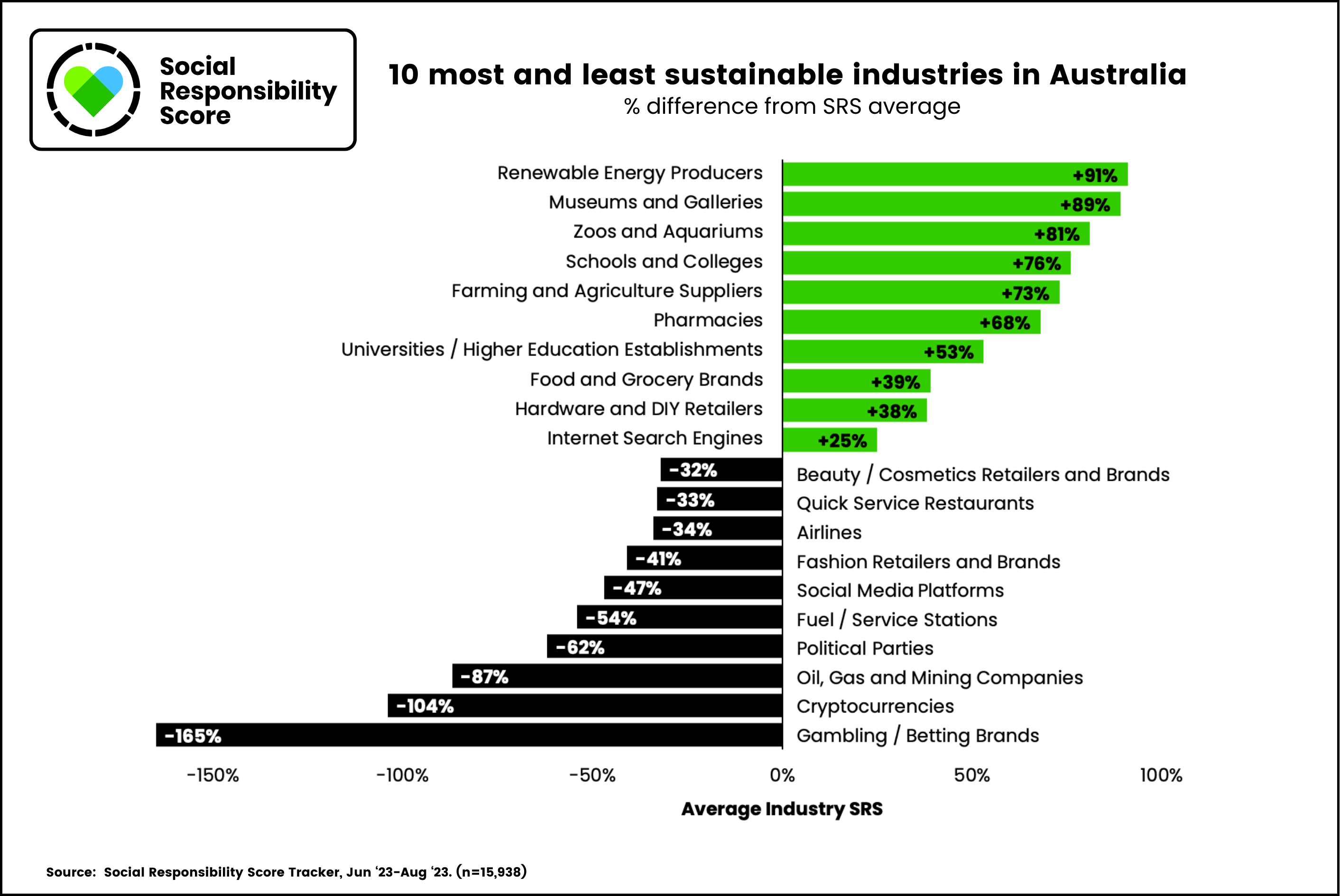We recently utilised Glow’s unique ESG (environment, social and governance) perception measure to identify the most and least sustainable industries in Australia according to consumers.
The findings show that the leading commercial industries in consumers’ minds are: renewable energy (environmental contribution), hardware & DIY retailers (community focus), and food and grocery (both environment and community contributions).
Those lagging combine both the obvious ‘damagers’ of the environment (natural resource extractors) and communities (gambling and sports betting) but also a number of industries that consumers believe should be doing much more than they are to support communities and the environment, such as QSR’s, fashion brands and retailers and airlines. Read on for more details.
This article utilises the opinions of 15,938 Australian adults aged 18 and over captured from June 2023-August 2023. The sample was nationally representative, and respondents were asked to provide their opinions about 51 industries. There have been an additional 21 industries added since the February 2022 Catalyst study was conducted
Fuelling the future: The Renewable Energy sector leads the charge
Of the commercially focussed industries we assessed, the Renewable Energy sector is seen as the industry most socially and environmentally responsible, as measured by the Social Responsibility Score metric.
This is hardly a surprise, given the focus on sustainability at the core of what these businesses offer. What it does show is that consumers are recognising the industry for leading the way and addressing their growing concerns about climate change.
Cultural and educational entertainment providers like museums, galleries, zoos, and aquariums also rate well in consumers’ minds, for their efforts in preserving artifacts and species that are important to our heritage and culture.
Educational institutions also perform well, a combination of their community contribution and preservation of knowledge.
Of the other commercial industries under measurement, the next best performers are pharmacies, hardware retailers, and food and grocery brands. Pharmacies and hardware retailers do well because they are seen as pillars of the community and praised for their social initiatives and efforts. The latter’s status was further elevated during the COVID-19 lockdown as people went DIY crazy, evident through the appreciation afforded the biggest player in the Australian hardware industry, Bunnings, which was ranked the #1 most socially and environmentally responsible retail brand by consumers.
Food & grocery brands continue to score high as a result of perceived strength in the areas of social and governance. However, consumers believe the sector needs to do more to address important environmental challenges, particularly addressing waste management and plastic usage, an area of setbacks recently following the collapse of the REDcycle scheme.
All bets are off: Lagging industries
At the other end of the scale, the Industries considered the least socially responsible include quick-serve restaurants, airlines, fashion retailers, social media, cryptocurrencies, natural resource extraction, and gambling and sports betting brands.
The gambling and sports betting sector scores poorly due to negative social impacts on mental, physical, and financial well-being.
Social media platforms are disliked for spreading misinformation, contributing to bullying, and for adverse effects on self-esteem and mental well-being.
Cryptocurrencies are a relatively new and volatile industry, raising questions about their impact on financial stability and consumer protection. Consumers also fear the energy intensity of ‘crypto-mining’ and the associated environmental impacts of growth in cryptocurrency usage.
Major industries with room to improve relative to others include quick-serve restaurants (fast food outlets), fashion brands and retailers, and the airline industry, with Australians ranking all three in the bottom ten industries regarding their social responsibility.
Nosedive: The decline of the Airline industry
The reputation of the airline industry has been hit hard recently, dropping from a score just below the average of all industries in 2022 to one of the worst 10 industries in 2023. This has been driven in large part by poor governance decisions at Qantas, Australia’s largest and historically most well-loved airline, where transparency and customer care failings have been in the spotlight.
Issues include numerous canceled flights, Qantas being found to have illegally outsourced 1,700 ground handler jobs, and allegations that Qantas continued to advertise tickets for thousands of cancelled flights last year. Ladder on top of that super-normal profits gouged from Australians struggling with a cost of living crisis, and it is no surprise that Qantas’ CEO has taken early retirement, leaving a beleaguered share price and a reputation in tatters.
This serves as a clear reminder that poor governance does not go unnoticed and that the commercial consequences of bad behavior can be dire as more and more consumers vote with their wallets for businesses that are trying to do better.
How is your brand seen?
The purpose of the social responsibility score metric is to help industries and brands understand what consumers think of their behaviour in critical areas relative to social contribution, environmental impact and governance performance.
By measuring perception, businesses can track the impact of their ESG efforts, and understand how to do better, so they can strike the right balance between shareholder returns and community expectations.
If you want to know how your brand is seen, learn about capturing your social responsibility score here.

Mike Johnston
Managing Director - Data Products

